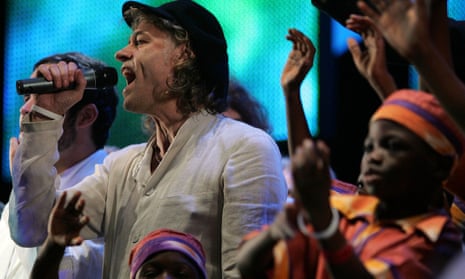Thirty years ago today Bob Geldof organised a star-studded concert at Wembley stadium to raise funds for Ethiopian famine victims. Live Aid reached 1.9 billion people across 150 countries, and raised £40m.
Geldof was, in a sense, the pioneer of a new breed of celebrity “missionaries” with his efforts to end the Ethiopian famine. Yet, as American journalist David Rieff has noted, Live Aid’s donations to NGOs such as Oxfam and Save the Children also facilitated the displacement of 600,000 people by the autocratic Mengistu regime, resulting in an estimated 100,000 deaths.
Three decades after Live Aid, it is clear that celebrity efforts to “save Africa” have often done more to reinforce negative media stereotypes about the “dark continent” and to portray its one billion citizens as helpless victims in a new “white man’s burden”. The Economist, for example, depicted Africa as a “hopeless continent” in 2000, with its then Africa editor, Richard Dowden, penning an equally prejudiced cover story.
Often naive celebrities have burnished their own reputations as new missionaries of a troubled age: Geldof and Bono are seeking to “end poverty”, George Clooney is “saving” Darfur, Madonna has adopted children in Malawi as if buying new pets, while Prince Harry is on his way to Namibia to “save” the black rhino.
This cult of celebrity has often led to a dangerous dumbing down of serious issues, brushing aside other innovative and resilient grassroots efforts.
At the 2005 G8 industrialised countries summit in Gleneagles, Scotland, during which Geldof and Bono organised the Live 8 concert, there was an almost Alice in Wonderland expectation that this club of eight rich men would be swayed by the tuneful ballads of musicians into “saving” Africa. The G8’s promises of eliminating agricultural export subsidies, doubling aid to Africa, and writing off debt, largely remain unfulfilled a decade later.
Geldof recently declared Gleneagles had “helped pave the way for a new world order”. This fanciful claim, however, clearly belongs more in the realm of fairytale. As the Ebola crisis unfolded in Liberia, Sierra Leone and Guinea last year, Geldof recorded Band Aid 30 for yet another cause, patronisingly singing that “there is no peace and joy in west Africa”.
Amid the new missionary age spawned by Live Aid, it is important to remember that Africa is a diverse continent of 55 countries. Long-running conflicts in Angola, Ethiopia, Liberia and Sierra Leone have been calmed; civil society activists have courageously fought for democratic freedoms in Benin, Zambia, Egypt, Tunisia and Burkina Faso; ruling parties have been voted out of office in Ghana, Senegal, Ivory Coast, Kenya and Nigeria; and members of Africa’s diaspora now contribute $60bn ($40m) annually to their home countries: more than the continent receives in foreign aid.
Africa certainly needs partners in a globalised world, but it may be time to light a bonfire of vanities for the celebrity-missionaries who seek to save us from ourselves.
- Dr Adekeye Adebajo is executive director of the Centre for Conflict Resolution, Cape Town, South Africa
